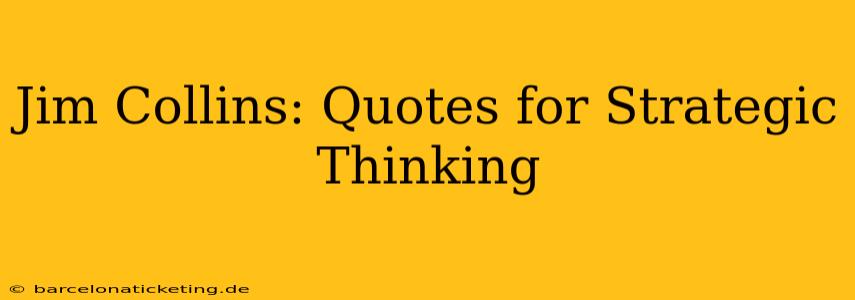Jim Collins, a renowned management consultant and author of several bestselling books like Good to Great and Built to Last, is a leading voice on strategic thinking and business success. His insightful observations, often distilled into powerful quotes, offer valuable lessons for leaders and organizations striving for sustainable growth and enduring excellence. This article delves into some of his most impactful quotes, exploring their meaning and implications for strategic decision-making. We'll also address common questions surrounding Collins' work and its practical application.
Understanding Jim Collins' Approach to Strategic Thinking
Before diving into specific quotes, it's crucial to understand the underlying principles of Collins' work. He emphasizes a data-driven, rigorous approach to understanding what separates truly great companies from merely good ones. His research involves extensive historical analysis, comparing companies within the same industry to identify recurring patterns of success and failure. This methodology leads to actionable insights that are both practical and deeply insightful. Collins' strategic thinking isn't about quick fixes or trendy management fads; it’s about building enduring organizations through disciplined, thoughtful execution.
Key Jim Collins Quotes and Their Implications for Strategic Thinking
Here are some of Jim Collins' most impactful quotes and their interpretations for strategic thinking:
"Good is the enemy of great." This deceptively simple statement highlights the danger of settling for mediocrity. Many organizations achieve a level of "good" performance and become complacent, failing to push for the transformative changes necessary to become truly great. This quote underscores the need for continuous improvement and a relentless pursuit of excellence. It necessitates a proactive approach to identifying areas for improvement and a willingness to challenge the status quo.
"Greatness is not a function of circumstance; greatness is a function of conscious choice and discipline." This quote emphasizes that success isn't simply a matter of luck or favorable circumstances. It's a deliberate process requiring conscious decisions, disciplined execution, and a commitment to long-term vision. Leaders must make proactive choices that align with their overarching strategy, even when faced with challenges or setbacks.
"The key is not primarily the ‘what’ but the ‘who.’" Collins stresses the importance of getting the right people on the bus—and the wrong people off the bus—before figuring out where to drive. Building a high-performing team with the right skills, values, and commitment is paramount to achieving strategic objectives. This involves careful selection, development, and retention of talent.
"Preserve the core; stimulate progress." This quote speaks to the importance of balancing stability with change. Organizations need to preserve their core values, culture, and strengths while simultaneously adapting to changing market conditions and pursuing innovation. This delicate balance is crucial for long-term sustainability and continued success.
Frequently Asked Questions about Jim Collins and Strategic Thinking
What are the core principles of Jim Collins' management philosophy?
Collins' management philosophy centers on rigorous data analysis, disciplined people selection, a focus on long-term vision, and a balance between preserving the core and stimulating progress. He emphasizes a disciplined, data-driven approach to strategy, emphasizing the importance of getting the right people on board and aligning the organization behind a clear vision.
How can I apply Jim Collins' ideas to my own organization?
Start by rigorously assessing your current state. Identify your core strengths and weaknesses, and honestly evaluate your team's capabilities. Then, develop a clear, long-term vision, and build a team capable of executing that vision. Focus on continuous improvement and actively manage change while preserving your core values.
What are some common pitfalls to avoid when implementing Jim Collins' strategies?
Common pitfalls include a lack of commitment to long-term vision, neglecting people management, clinging to outdated strategies, and a fear of making tough decisions. Successful implementation requires a sustained commitment to disciplined execution and a willingness to adapt to evolving circumstances.
Are there any criticisms of Jim Collins' work?
While widely influential, some critics argue that Collins' methodology relies too heavily on retrospective analysis, potentially overlooking crucial contextual factors. Others point out that his research focuses primarily on large, successful companies, limiting its generalizability to smaller businesses or organizations in different contexts. Despite these criticisms, his work remains a valuable resource for anyone seeking to improve their strategic thinking and achieve sustainable organizational success.
In conclusion, Jim Collins' insights offer a powerful framework for strategic thinking, emphasizing disciplined execution, people-centric leadership, and a long-term perspective. By carefully considering these principles, organizations can strive for greatness and build enduring success.

